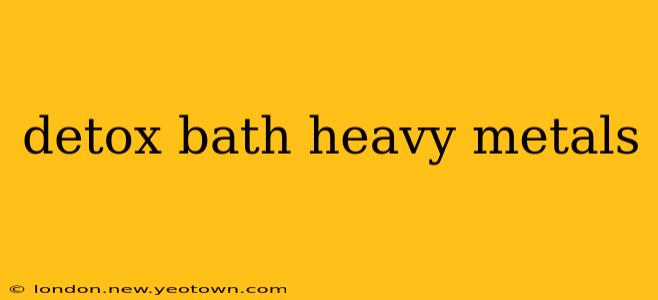Detox Bath for Heavy Metals: Can a Soak Really Help?
The idea of soaking away the day's stresses in a warm bath is universally appealing. But what if that bath could also help your body rid itself of heavy metals? The concept of a detox bath for heavy metals is alluring, promising a natural way to cleanse your system of potentially harmful substances. But does the science back up the hype? Let's dive in.
This isn't about a quick fix; rather, it's about understanding the potential benefits and limitations of using detox baths as part of a broader approach to heavy metal detoxification.
What are Heavy Metals and Why are They Harmful?
Heavy metals are naturally occurring elements with high density that can be toxic even in small amounts. Think mercury, lead, arsenic, cadmium – these aren't substances you want accumulating in your body. Exposure can come from various sources, including environmental pollution, contaminated food and water, and certain occupations. The dangers of heavy metal accumulation can range from mild neurological issues to severe organ damage, depending on the metal, the level of exposure, and individual factors.
Can a Detox Bath Really Remove Heavy Metals?
This is where things get a bit nuanced. While a detox bath isn't going to magically eliminate significant heavy metal burdens, the evidence suggests it might offer some assistance in supporting your body's natural detoxification processes. The idea is that certain bath additives can help draw out toxins through the skin, though the extent to which this occurs is still being researched.
What Ingredients are Commonly Used in Heavy Metal Detox Baths?
Several ingredients commonly appear in recipes for detox baths aimed at heavy metal removal:
- Epsom Salts (Magnesium Sulfate): Magnesium is known to play a role in various bodily functions, and some believe it can aid in the removal of toxins.
- Baking Soda (Sodium Bicarbonate): Baking soda can help alkalize the bath water, potentially influencing the body's ability to excrete toxins.
- Activated Charcoal: This highly porous substance is often used to bind to toxins, potentially assisting in their elimination. However, research on its effectiveness for heavy metal detoxification is ongoing.
- Clay (e.g., Bentonite Clay): Some clays are believed to have absorbent properties that can bind to heavy metals.
It's crucial to remember that the concentration and combination of these ingredients can significantly affect the outcome.
What are the Benefits of a Detox Bath?
While the direct heavy metal removal might be limited, a detox bath can still provide some benefits:
- Relaxation and Stress Reduction: The simple act of soaking in warm water is incredibly relaxing and can help reduce stress, indirectly supporting overall well-being. Stress can exacerbate the effects of toxins in the body.
- Improved Skin Health: Certain ingredients, like Epsom salts, can improve skin hydration and reduce inflammation.
- Improved Sleep: A warm bath before bed can promote relaxation and better sleep.
How Often Should You Take a Detox Bath?
There's no universally agreed-upon frequency. However, a good guideline would be 1-2 times per week, and always listen to your body. If you experience any adverse reactions, stop immediately.
Are There Any Risks or Side Effects?
While generally safe, some individuals might experience skin irritation or allergic reactions to certain bath additives. It’s crucial to start with a small amount of each ingredient to assess your tolerance. Pregnant or breastfeeding women, and individuals with pre-existing medical conditions, should consult their doctor before trying a detox bath.
What are Other Ways to Detoxify from Heavy Metals?
Detox baths should be viewed as one component of a broader strategy, not a standalone solution. Other approaches include:
- Chelation Therapy: This medically supervised treatment uses medications to bind to heavy metals and help remove them from the body.
- Dietary Changes: Focusing on a diet rich in fruits, vegetables, and antioxidants can support the body's natural detoxification processes.
- Supplementation: Certain supplements, such as selenium and glutathione, are believed to support detoxification. Always consult with a healthcare professional before taking any supplements.
Disclaimer: This information is for educational purposes only and should not be considered medical advice. If you suspect heavy metal toxicity, consult a healthcare professional for proper diagnosis and treatment. Don't rely solely on detox baths to address significant heavy metal exposure. They can be a helpful adjunct to other, more comprehensive strategies.

